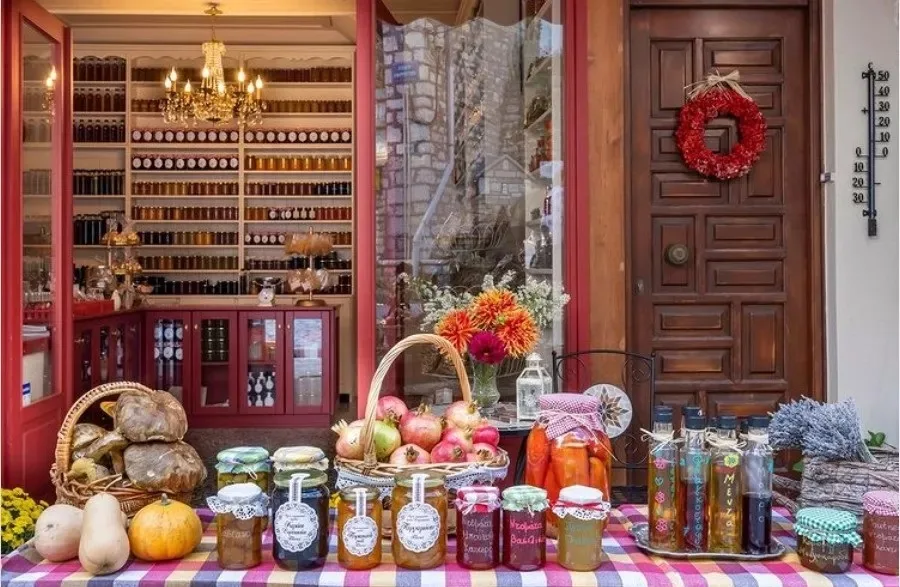The raw ingredients inspire them, the culinary tradition motivates them, and their passion directs them. In "Evriti," a traditional new grocer with a modern aesthetic that also functions as a workshop for local products, a group of young, active, and creative people sell all the sweetness and history of the local land.
Jams, chutneys, liqueurs, spoon sweets, honey, herbs, and pasta make up the mosaic of local tasting, inviting foreigners and locals alike to dive into the mostly fruity treasures of Megalo Chorio (a few kilometres from Karpenisi in Central Greece).
"Our love for this place, for its culinary culture, for its rich fruits that give birth to its trees and fields, united us under the umbrella of a common vision," Stefania Kokotini, founding member and communications manager, tells me of the Social Cooperative Enterprise "Evriti".
What was that vision? To use the local recipes lost in the depths of the past, pass them on to the next generations, and, of course, prove that Karpenisi's reputation does not deserve to be limited only to its prosperous livestock tradition.
From the tree to the pot

Here, everything is done, literally, by hand: from the first stage of harvesting and transporting the fruits to the workshop (70% of the raw materials come from the fields of the cooperative members and the forest) to the prepping and cooking and, afterwards, the packaging of the products.
"Each job is completed with dedication and rhythm, like a home craftsperson," Stefania said.
She stands by the importance they give to the seasonality of their materials, which determines the choice and quantity of products.
"We work," she tells me, "with 50 small producers and ten beekeepers. Our core is Evrytania, but wherever we find good producers, we ask for their products.
"So, from our region, we get cherries, quinces, sour cherries, pumpkins and apples; from Agrinio we get citrus fruits; from Fthiotida we get raspberries, which are also organically grown, as well as tomatoes; from Domoko we get wines; from regions of northern Greece we get blueberries and some peppers, while from Crete comes the - also organic - petimezi that we use to make the jams and spoon sweets."
The award-winning jam and chutney that oozes tradition

Two years ago, one of their most popular products, the Apricot jam with wild mint and hibiscus, was recognised internationally, as it was awarded the Golden Mediterranean award, while the Koromila jam with nutmeg enjoyed a similar response.
"This is", notes Stefania, "our first jam made in the workshop, as that year, the production of Koromila was surprisingly high."
What makes it so special?
"The fact that it fits equally well, as a base, for both sweet and savoury breakfasts," she tells me and urges me to try it with cold meats.
Beyond that, other jam products also claim their own fans: Citrus jams such as those with orange and chocolate, orange, star anise and cardamom, or orange and carrot, but also with lemon, as well as the lemon-lavender jam.
Equally popular are jams with strawberry and mint, chestnut, rum and chocolate, persimmons and cognac, or quince, clove, and ginger.
There are more than twenty choices for the chutneys here.
"In some villages," Stefania tells me, "they choose the vegan version of the traditional stew that replaces the meat with the chestnut. But otherwise, everything else remains the same: The tomato juice or the vinegar that goes into a classic stew anyway."
Other chutneys, such as apple with curry, pumpkin with turmeric and poppy seed, quince with pink pepper, and beetroot with aronia, rosemary and ginger, complement the shelves.
However, even the spoon sweets do not lack inspiration.
"Inspiration and love in grandma's old recipes," adds Stefania, who jokingly tells me: "If you knock on the door of a house here in Evrytania, even today, the woman who opens it will offer you four things: walnut, quince—here it is made with walnut instead of almond—stone cherry, and sour cherry.
"However, we have evolved, as in the workshop we even make carrot or grapefruit".
The annual culinary bridge with Istanbul

Every summer, on the initiative of the members of Evriti, a celebration is organised in Megalo Chorio, a culinary bridge between the town and Istanbul.
"This thought of ours," Stefania tells me, "started from an attempt to highlight an important part of Evrytanian history and how it has been linked for centuries to the culture and civilisation of the East."
According to history, in the 14th century, the first immigrants arrived from Evrytania in Constantinople. They gradually moved into trade, mastering, among other things, the art of grocery stores.
"Returning, however, back to their place," she adds, "they inevitably brought with them urban elements of Turkish culture, opening up new horizons in the region's, until then, strictly cattle-breeding identity."
And just like that, and with the assistance of Evriti today, Istanbul and Evrytania continue their shared journey through the streets of history, through festival gatherings that bind tastes, aromas and memories.
"And what are you preparing this year?" I am asking with interest.
"This year, the celebration will take place in Kerasochori, and it will be about pies. Oriental pies and our own pies, in parallel for the young to learn and the old to remember".
info: Megalo Horio, tel. 22370-41441, https://evriti-megalohorio.gr/
Loukia Chrysovitsanou is a columnist for Olive Magazine.
READ MORE: Vaso Panourgia - The woman behind the only bookbindery in Ioannina.


